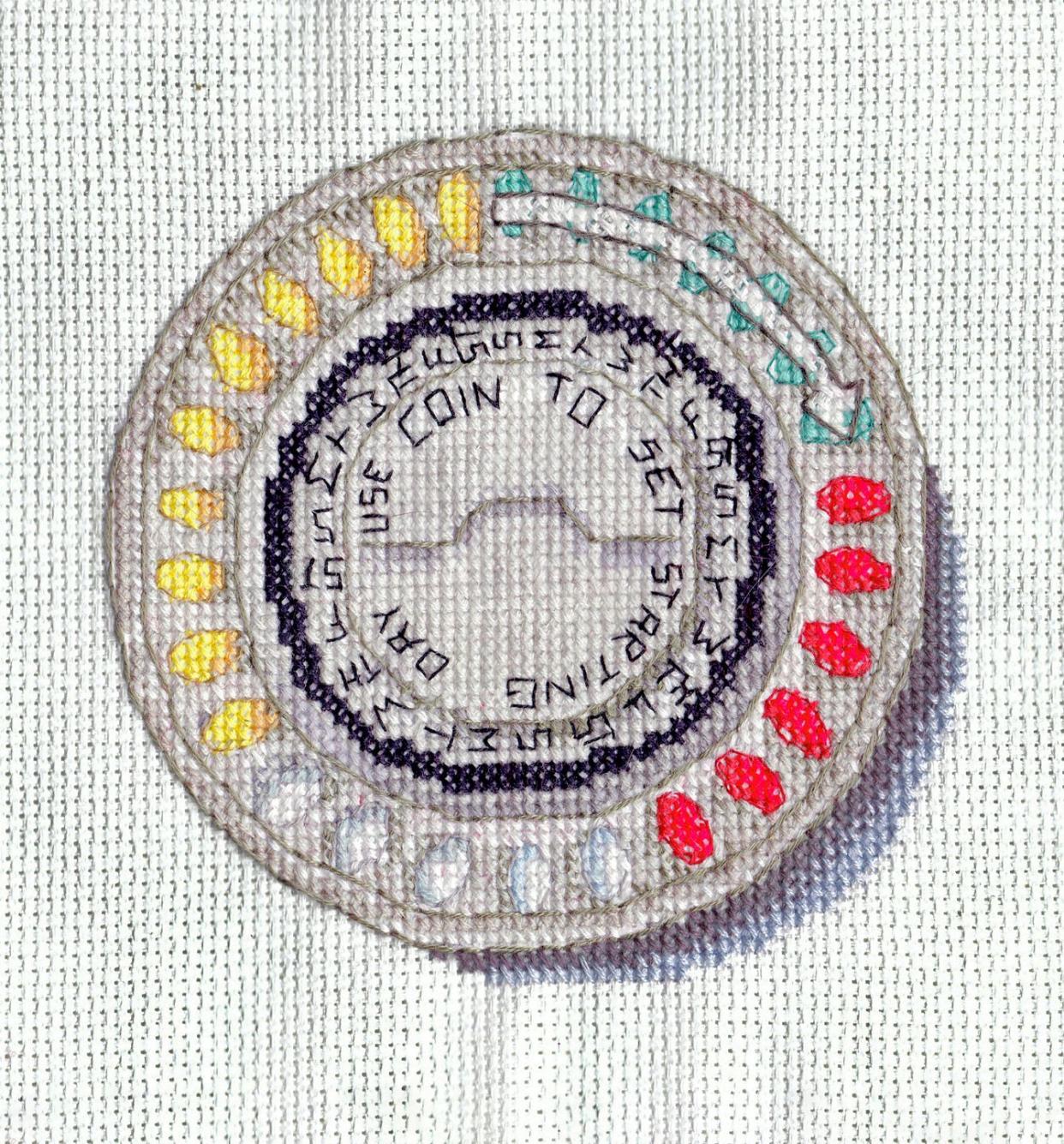Yes, They Are Coming for Your Birth Control

It was after 4 P.M. on Friday, Sept. 23, 2022, when assistant professor Johanna Gosse received an email with the subject line “Guidance on Abortion Laws.” The email was addressed to all employees of the University of Idaho, where Gosse teaches art history, and contained a memo from the university’s Office of the General Counsel, summarizing Idaho state laws regarding abortion.
The memo stated that the university prohibited employees from promoting abortion, counseling in favor of abortion, referring for abortion, dispensing emergency contraception (except in the case of rape), and advertising or promoting services for abortion. But it didn’t stop there: It also warned employees that “the prevention of conception,” was against the broad language of the state’s law, and recommended that the university not provide “standard birth control” at all. The memo also noted that those who violated these laws could face a misdemeanor or felony conviction, mandatory loss of state employment, and a permanent bar from future state employment.
Gosse was appalled. The memo’s ostensible purpose was to provide clarity to staff so they wouldn’t run afoul of state law, but to Gosse, it had the opposite effect. It came off “not as a friendly warning from your university legal team, but actually a kind of slap in the face,” she says. It felt like a threat—don’t say the a-word, or else—wrapped up in a package of legalese. At the time, Gosse was conducting research on the artist Edward Kienholz, whose portfolio includes two prominent sculptural installations about abortion. She worried continuing to discuss abortion and contraception—even in art history class—would make her vulnerable to prosecution.
It was hard not to be confused by the university’s memo. Did mentioning the location of the nearest Planned Parenthood clinic—about 15 minutes across the state border in Pullman, Washington—constitute “promotion”? Would resident advisors be jailed for telling a student that Plan B was available at Walmart? Were condoms and birth control pills now contraband? Those questions seemed dystopian and absurd, and yet, this is our new post-Roe v. Wade reality.
The memo was sent three months after the Supreme Court issued its decision in Dobbs v. Jackson Women’s Health Organization, which a year ago on June 24, 2022, overturned Roe v. Wade. At the time, 26 states, including Idaho, had trigger bans or other legislation proposed or in place to restrict abortions, according to the Guttmacher Institute.
Now, after accomplishing its long-held dream of ending Roe, the antiabortion movement has turned its focus to a new target: birth control, with several states introducing legislation that could restrict or outlaw certain forms. If left unopposed, it is clear there are some politicians, judges, and activists who would not only deny people the ability to end unwanted pregnancies, but also the ability to prevent pregnancies in the first place.
In his concurring opinion in the Dobbs case, Justice Clarence Thomas wrote that the court should reconsider all cases based on the same right to privacy precedent, including Griswold v. Connecticut, which granted married couples the right to access contraception. Even before Dobbs, there was a series of court cases that involved plaintiffs who defined certain birth control as “abortifacients” (meaning they induce abortions), including the 2014 Supreme Court decision in Burwell v. Hobby Lobby Stores, Inc., which ruled that small for-profit corporations could not be required to pay for insurance coverage for forms of contraception they opposed on religious or moral grounds. (Hobby Lobby’s owners specifically targeted the morning-after pill and hormonal IUDs, believing incorrectly that these forms of birth control amount to abortion.)

When summarizing the argument of a religious group during his 2018 confirmation hearings, Justice Brett Kavanaugh referred to birth control as “abortion-inducing drugs, and then in 2020, in Little Sisters of the Poor Saints Peter and Paul Home v. Pennsylvania, the Supreme Court upheld the Trump Administration’s executive order allowing nonprofit religious employers to deny birth control on both religious and moral grounds. (In an amicus brief to the court ahead of its decision, 50 Catholic theologians and ethicists wrote that abortion, contraception and sterilization “are grave wrongs under the Catholic faith.”)
Some people in the anti-abortion movement have conflated abortion and contraception for years, with the ultimate goal of outlawing both. Back in 2017, Kristan Hawkins, the founder of Students for Life, went on MSNBC host Joy Reid’s show and said she personally didn’t believe that many forms of contraception—including the birth control pill and IUDs—should be legal. Students for Life’s website also labels oral contraceptives, IUDs, and other hormonal methods like implants and rings, as well as morning-after pills, as “abortifacients,” and its members have taken the same position on social media, mainstream media, and cable news outlets.
Birth control, to be clear, is not abortion. Most hormonal birth control methods as well as emergency contraception work by preventing or delaying the body from releasing an egg, and by preventing sperm from reaching eggs. They prevent fertilization—not implantation—aka pregnancy, which the American College of Obstetricians and Gynecologists defines as when the fertilized egg attaches to the lining of the uterus. Jennifer Lincoln, MD, an ob-gyn in Oregon, said that while these claims have no basis in science, lumping contraception and abortion together is part of a long-term strategy to pass laws that are ever more extreme. “We know that they just don’t want to stop at abortion,” Lincoln says. “The next thing to go for is contraception.”
This is a radical stance. Around 90 percent of Americans support access to birth control pills and condoms, 81 percent support access to IUDs, and 70 percent believe emergency contraception should be legal, according to a 2022 poll from FiveThirtyEight/Ipsos. Further, a 2022 Gallup poll found 92 percent of Americans believe birth control is “morally acceptable.”

Yet despite the popularity of contraception, politicians in red states are actively attempting to curtail access to it. Less than 48 hours after the Dobbs decision leaked in May, Republican state legislators in Louisiana put forward a bill that would not only classify abortion as homicide, but also had the potential to be used to outlaw birth control pills, IUDs, and emergency contraception, as well as in-vitro fertilization. In Missouri, conservative legislators tried to strip away Medicaid coverage for emergency contraception and some IUDs. And after the Dobbs decision, a health care system in the Kansas City area announced it would stop offering emergency contraception after the state banned abortion with only the exception of medical emergencies. (The hospital reversed course nearly 24-hours later when the Missouri Attorney General’s and the state’s Governor’s offices clarified that the new law did not prohibit the use of Plan B or contraception.)
In Texas, a federal judge issued a ruling that made it nearly impossible for teens to access contraceptives through Title X programs without their parents’ permission. In Idaho, the chair of the House State Affairs Committee has pledged to hold hearings on banning emergency contraception, and said he was not yet certain where he stood with regard to IUDs. And all of this comes amid Republican rollbacks of federal and state family planning programs. In June 2022, just weeks before the Dobbs decision, Florida Governor Ron DeSantis vetoed legislation that would have provided millions of dollars to help low-income people access long-acting birth control, like IUDs and the shot.

On the federal level, Republicans blocked the passage of the Right to Contraception Act in 2022, which would have protected the right to birth control. In another effort to protect access, Democrats have introduced the Expanding Access to Family Planning Act, which would provide $500 million in annual mandatory funding for Title X, which provides birth control to low-income people, over the next decade (as opposed to the program having to fight for funding each year).“[It is] crystal clear that anti-choice activists and far-right lawmakers are targeting access to contraception and birth control,” says Senator Kirsten Gillibrand (D-NY), who is an original cosponsor of the bill. “Federal legislation is essential to protect the right to birth control, but Democrats will need to take back full control of the government and increase our margins [in order to pass it].”
Although no state has yet managed to ban contraceptives outright, such efforts have created a chilling effect in which institutions that are worried about violating the law err on the side of caution. The University of Idaho memo noted the “new and evolving legal landscape,” and that certain statutes were “unclear and untested” in the courts, and thus the university was advising a “conservative approach”—one that seemed to make it difficult for people to have even basic conversations about reproductive health on campus.
The full memo was seven pages long, and aimed to parse two laws that affected university employees, including professors, administrative staff, and students with jobs through the university, like resident advisors. The first law mentioned was called the “No Public Funds for Abortion” act, which the Idaho state legislature passed in 2021. The law prohibited state employees from counseling in favor of abortion or making referrals to abortion providers, and from dispensing emergency contraception. The ACLU described it as a “gag rule,” and called it a “blatant attempt to defund Planned Parenthood, which in turn threatens the ability for Idahoans to get basic, preventative health care such as lifesaving cancer screenings, birth control, STI testing and treatment, and regular reproductive wellness exams.” The second law the memo cited was from 1972, and banned anyone who wasn’t a licensed physician or health care provider from “advertising medicines or other means for preventing conception, or facilitating miscarriage or abortion.”
Almost immediately, the memo led to an outcry from students and faculty and attracted attention from the national media; even President Joe Biden weighed in: “Folks, what century are we in? What are we doing? I respect everyone’s view on this—personal decisions they make. But, my Lord, we’re talking about contraception here. It shouldn’t be that controversial.”
A few days after the memo was issued, members of the faculty senate were given a chance to ask questions and share concerns, but Gosse says the administration seemed to dismiss and downplay their anxieties. “It constitutes a vast form of institutional gaslighting to say, ‘This is illegal, and you could be fired and it’s a felony, but don’t worry,’” she says. Gosse refused to change a “single PowerPoint slide” in her course, but said, “I wouldn’t be surprised if faculty in anthropology or sociology second guessed their content.” (The university administration did not respond to multiple requests for comment.)

University of Idaho senior Katie Hettinga didn’t hear about the memo until Monday morning, when she went to her job in the Department of Student Involvement and a friend asked if she’d heard about “this abortion memo thing.” “It was frustrating to read as a student, as a woman, and as an employee,” Hettinga says. “It was frustrating to hear you can’t promote contraception or talk about abortion in all these different ways.”
That semester, Hettinga was enrolled in a 400-level course on politics, policy, and gender. She had expected the course to include lectures on abortion and reproductive rights, but according to her, it did not. The memo had noted classroom discussions on topics related to abortion and birth control were still allowed, as long as they were relevant to the subject at hand and the instructor maintained neutrality. “I really am just incredibly disappointed that we weren’t able to talk about abortion in a high-level politics, policy, and gender class,” Hettinga says. “I was really looking forward to that.”
The same morass has affected any class where abortion and contraception might come up—women’s history, film, biology, philosophy, criminal justice—as well as extracurricular activities. One club that handed out free condoms on Fridays was advised to say they were for preventing STIs instead of pregnancy. No one knew where the boundaries were, and it felt risky to test them. “In general, advising anybody on abortion care in Idaho, you have to tread very lightly, no matter who you are,” says sophomore Lily Payne. “Even contraception is definitely a gray area here.” The student health center on campus is still providing access to birth control, but not emergency contraception.
The University of Idaho administration has received most of the blowback for sending the memo. Two weeks after it was sent, the university president and provost sent an email saying the memo did not represent a change in school policy, but there has been no further written clarification since.
But even students and faculty who were alarmed by its contents note that it’s really Idaho’s legislature that should take the heat, because they passed these laws in the first place. Deeply conservative politicians have gained power in the state, and are enacting ever more extreme policies. In early April, Idaho became the first state to pass a law explicitly restricting out-of-state travel for abortions for minors (aiding such travel by giving money, a ride, or setting up an appointment is also punishable), and the state’s attorney general has said it is a crime for health care professionals to prescribe abortion pills for women to pick up across state lines. Two hospitals in the state have recently stopped providing labor and delivery services, citing doctor shortages and the “political climate.” “It’s all being done incrementally, so people maybe don’t notice,” says Terri Pickens, a lawyer who has served on the board of the regional Planned Parenthood affiliate. “And then all of a sudden, there’s no reproductive health care, period, in the state of Idaho. That’s their end game. And it’s not just Idaho. That’s what they want to do nationwide.”
You Might Also Like
